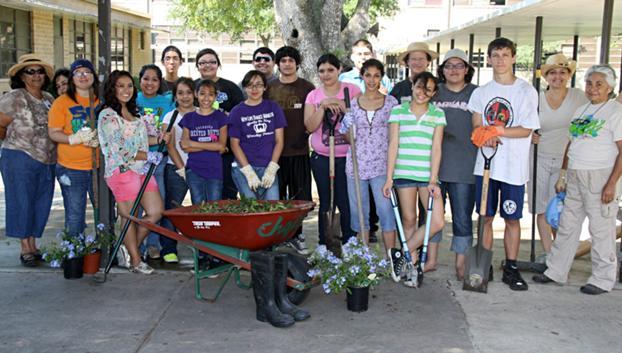Driving Educational Attainment Forward Through Community Initiatives
Posted on 11/02/2015 @ 06:45 PM

Ford Driving Dreams Participants; LULAC Council #4692; Victoria, Texas
By: Elisa Aquino, Education and Youth Programs Intern, LULAC National
In California, for every 100 Latino students who enter a ninth-grade classroom, only 61 leave high school with a diploma in hand. This is an alarming statistic that demonstrates that Latinos are falling behind in California, and the stats don’t look much better throughout the nation. As the Latino population becomes the largest minority group in the country, this issue must be addressed not only in our communities, but at all levels of government. High school completion and a good education is beneficial to both the individual and the American economy. A lack of a high school diploma can jeopardize long-term economic security, employment security, and earning potential. Closing the attainment gap also benefits our economy, allowing it to grow by $2.3 trillion by 2050. Thus, it is important to develop programs that target high school completion/graduation in the Latino community.
LULAC advocates for educational equity for Latino students and has created a variety of programs to help alleviate these disparities while simultaneously advocating for legislative solutions. Because of this, LULAC and Ford Motor Company Fund are partnering to address high school dropout rates through the Ford Driving Dreams (FDD) Grants program. This program allows LULAC Councils to develop their own curriculum that will address the specific needs in their community, with the overall goal of stimulating academic achievement, increasing high school completion rates and college enrollment. Each award recipient receives $20,000 over the course of two years for them to carry out their program.
Every participating council implements each program differently. Activities range from visiting colleges and meeting with students and professors, to supporting students through the college application process, to providing tutoring sessions, and even providing STEM career opportunity workshops, all free of cost to participating students. The participants often include students who are first generation college-bound, low-income (whose parents make $50,000 and below), Latino, Spanish-speaking/bilingual students, or a combination of these demographic groups. This program addresses the needs of students who otherwise would be neglected and ignored by a public school system that often leaves behind low-income students of color. By providing them with the skills and tools necessary for their educational success, LULAC helps empower these students to fight for their future.
To look at just how the Ford Driving Dreams Grants program has significantly improved the lives of its participants, look at the data. For example, in Austin, Texas participants aimed to attain a 3.33 GPA, and by spring of 2014 the group had earned an average GPA of 3.48. In addition, 58.33% of the students at this location thanked the FDD program for inspiring them to be the first in their families to go to college. In this same report, in El Paso, Texas, in one year, students improved their GPA from a 2.69 to a 3.31, Of these students, 89% of them plan to attend college, in contrast to the 57.9% that thought it was very important to go to college at the beginning of the program.
FDD has become one of LULAC’s flagship educational programs, and its effectiveness and success have received national recognition. In September 2015, FDD was selected by the White House Initiative on Educational Excellence for Hispanics as a “Bright Spots in Hispanic Education” for their outstanding commitment to closing the high school completion gap in the Latino community.
Growing up as a first generation college Latina student, in my family, higher education was always emphasized particularly because both of my parents were immigrants with very little education. Both my parents migrated from a small pueblo in Oaxaca, Mexico. Their native language being Zapotec, they didn’t learn Spanish until they went to school at around the age of 5. Due to the poverty in their pueblo, both of my parents were forced to work in the fields and were not able to finish elementary school. My parents always share with me that if they would have been given the resources to continue their education, they would have taken the opportunity to do so. Seeing their struggles in the U.S., I have come to value the importance of completing high school and continuing to pursue higher education opportunities. I appreciate that organizations like LULAC are proactively addressing the issue of Latino high school dropout rates through empowering Latinos to graduate high school and pursue higher education. By helping students with similar background stories like myself, LULAC and Ford Motor Company Fund's partnership is one that is changing communities, not only at the local level, but nationally as well.
Elisa Aquino is an Education and Youth Leadership Programs Intern at the LULAC National Office in Washington D.C. Elisa is a fourth year student at the University of California, Santa Cruz majoring in Sociology and Latin American Latino Studies and will be graduating this upcoming spring of 2016.

Comments
Leave a Comment
You must be logged in to leave a comment.